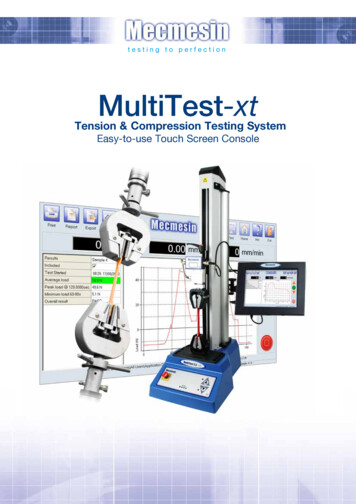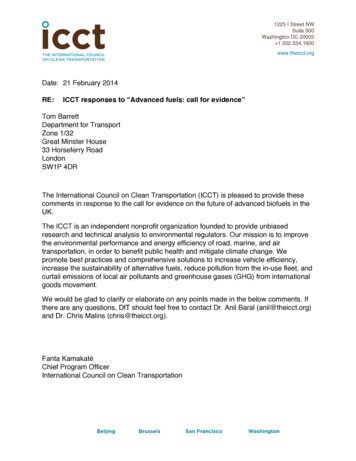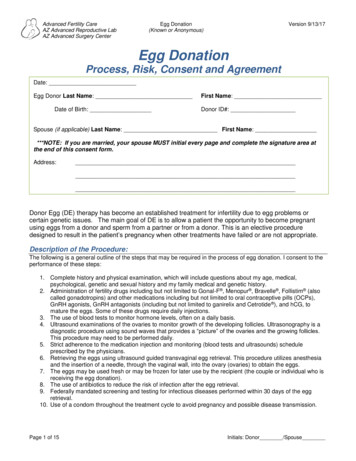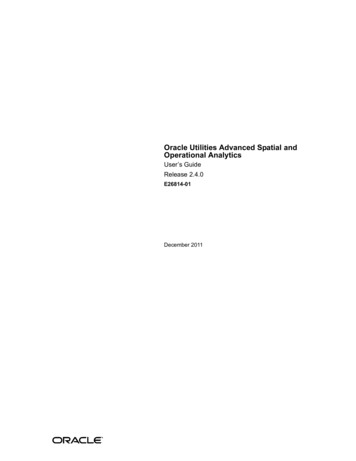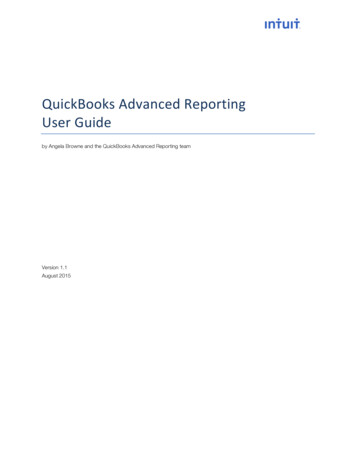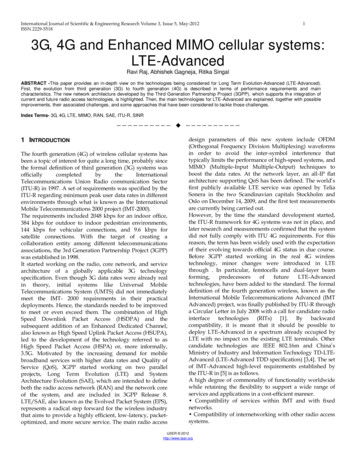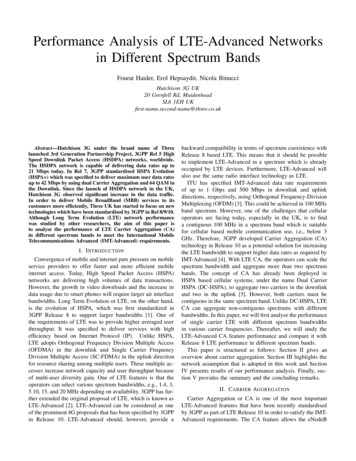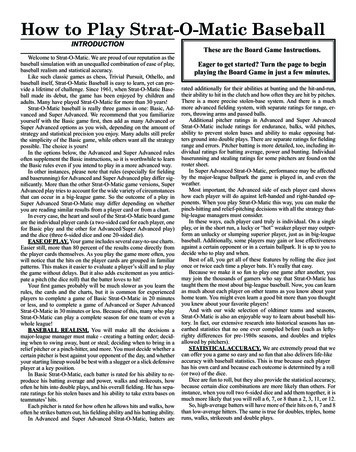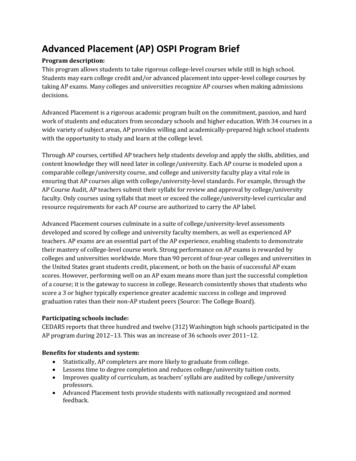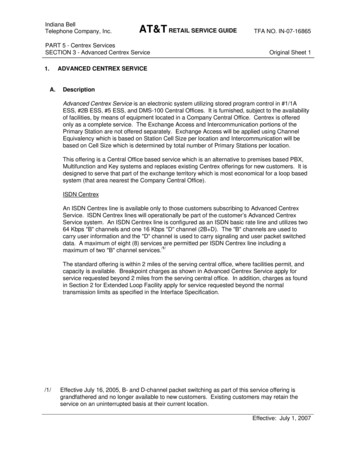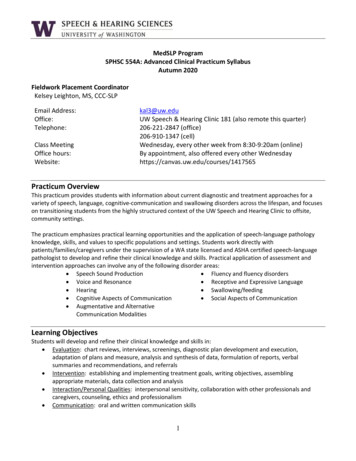
Transcription
MedSLP ProgramSPHSC 554A: Advanced Clinical Practicum SyllabusAutumn 2020Fieldwork Placement CoordinatorKelsey Leighton, MS, CCC-SLPEmail Address:Office:Telephone:Class MeetingOffice hours:Website:kal3@uw.eduUW Speech & Hearing Clinic 181 (also remote this quarter)206-221-2847 (office)206-910-1347 (cell)Wednesday, every other week from 8:30-9:20am (online)By appointment, also offered every other ticum OverviewThis practicum provides students with information about current diagnostic and treatment approaches for avariety of speech, language, cognitive-communication and swallowing disorders across the lifespan, and focuseson transitioning students from the highly structured context of the UW Speech and Hearing Clinic to offsite,community settings.The practicum emphasizes practical learning opportunities and the application of speech-language pathologyknowledge, skills, and values to specific populations and settings. Students work directly withpatients/families/caregivers under the supervision of a WA state licensed and ASHA certified speech-languagepathologist to develop and refine their clinical knowledge and skills. Practical application of assessment andintervention approaches can involve any of the following disorder areas: Speech Sound Production Fluency and fluency disorders Voice and Resonance Receptive and Expressive Language Hearing Swallowing/feeding Cognitive Aspects of Communication Social Aspects of Communication Augmentative and AlternativeCommunication ModalitiesLearning ObjectivesStudents will develop and refine their clinical knowledge and skills in: Evaluation: chart reviews, interviews, screenings, diagnostic plan development and execution,adaptation of plans and measure, analysis and synthesis of data, formulation of reports, verbalsummaries and recommendations, and referrals Intervention: establishing and implementing treatment goals, writing objectives, assemblingappropriate materials, data collection and analysis Interaction/Personal Qualities: interpersonal sensitivity, collaboration with other professionals andcaregivers, counseling, ethics and professionalism Communication: oral and written communication skills1
TextThere is no required text. Students engage in weekly clinical interactions with their supervisor and are providedwith examples, models, handouts, articles, etc. as appropriate.Practicum requirements1. Participation and attendance in practicum experience Complete all prerequisites for assigned offsite placements as communicated. Students will accessTyphon to review information about their site and placement each quarter. Unless notified of other arrangements:o Autumn, Winter and Spring / attend the practicum site 16-20 hours per week for the 10 weeksof the quarter.o Summer / attend the practicum site 40 hours per week for the full 9 weeks of the quarter. Mondays, Tuesdays, and Thursdays are available for scheduling during Autumn, Winter, and Springquarters to allow for some flexibility in finalizing the schedule. Students need to be prepared to shiftdays if required to accommodate site and/or patient needs. At the beginning of the quarter, request leave from site supervisor and the Fieldwork PlacementCoordinator (FPC) in order for any planned absences to be considered excused. In the event of illness, notify BOTH the offsite supervisor and the FPC of an absence. Work at the practicum site during finals week to make up necessary practicum hours and complete finalpaperwork and reviews as needed, per supervisor discretion. Adhere to the schedule and clinical assignments specified by the UW/supervisor. Client/patientschedules can change in the field and students will work directly with supervisors to accommodate thesesituations2. Completion of clinical reviews and clock hours documentation Complete an official midpoint Student Clinical Evaluation with your offsite practicum supervisor duringweek 5 of the quarter.o The fieldwork team will send a reminder to supervisors, but it is your responsibility tocoordinate a specific meeting time AND communicate the review date and time to the FPC oncescheduled.o Students bring a Typhon Case Log report summary to supervisor for verification of hours to date.o Students need to notify the FPC of any circumstances in which this review does not occur.Complete a midpoint meeting with the FPC after you’ve completed your midpoint review. The purposeis to discuss your clinical experiences and progress at this site. A sign-up link will be emailed to you.o This meeting should occur no later than week 7 during Fall, Winter and Spring quarters, and nolater than week 6 during Summer quarter.o Students are responsible for bringing their practicum documentation, including clinical clockhours to date.Complete a final Student Clinical Evaluations with your offsite practicum supervisor during the lastweek of the quarter or finals week.o The fieldwork team will send a reminder to supervisors, but it is your responsibility tocoordinate a specific review meeting on or before the last day of the quarter AND communicatethe review date and time to the FPC once scheduled.o Students will bring Typhon Case Log report summary to supervisor for verification of hours todate.o Students need to notify the FPC of any circumstances in which this review does not occur.2
3. Documentation/organization of Offsite Materials Maintain updated Typhon profile and compliance requirements:1. Immunizations2. Adult and Child BLS CPR/CPR for Healthcare workers3. Background check4. HIPAA training5. Bloodborne Pathogens Please note that failure to maintain current documentation of clinical compliance requirements, per thenew student guide, can result in a temporary stop to clinical placements until such time asdocumentation requirements are met.Access and use the information and materials on the Fieldwork website. These materials include but arenot limited to: syllabus, clinical learning expectations, class assignments, and the general informationand procedures document.Maintain electronic and/or hard copies of the following for your records:a. Student Clinical Evaluations (maintained on Typhon)b. Clinical clock hour documentation (hard copy and on Typhon)c. Graduate Student Clinician Learning Profile (electronic)4. Completion of Assignments Clinical Learning Profile (Due 1st week of the quarter)a. Upload to Typhonb. Share with your supervisors at each placement Learning Contract (Due 1st week of the quarter)a. Complete with your supervisors at each placementb. Upload to Typhon by the end of the 2nd of each quarter Online Discussion/Reflectionsa. See details on Lecture information page of this document.ASHA HoursCovid-19 Updates: Please see the ASHA update from CAA and CFCC on supervisedclinical experiences. As well as the CFCC details on supervision that have beenextended through June 30, 2021. These details offer information such as theallowance that unlimited hours may now be obtained through telepractice. Multiplestudents may also be on the same telepractice session and may each earn the fullhour. For clinical educators, they have delayed enforcement of the additionalsupervisory CE requirements for clinical educators until January 1, 2021.3
As you all know, part of your program involves supervised clinical experiences that involve “direct client/patientcontact.” Direct client/patient contact hours must be within the ASHA Scope of Practice in Speech-LanguagePathology and must be under the supervision of a qualified professional who holds current ASHA certification inthe appropriate practice area. During each clinical rotation there are several ways that you can acquire theseexperiences to meet this requirement.Most of your experience will be your individual clinical sessions during a scheduled treatment or evaluation forspeech, language, voice, swallowing, cognition and communication. Another activity that meets the “directcontact” requirement is in conferences where you gain and share information as part of either afamily/caregiver training, home exercise plan development, or treatment/evaluation conference (i.e., where youengage in counseling related to a diagnosis, a risk assessment, and any associated recommendations/referrals).An additional source of ASHA direct contact hours can come from participation in treatment, evaluation orcounseling activities conducted by an allied health professional or you with your client in a communitysetting. One example of this is a structured communication sampling usually conducted while another clinicianengages in a conversation or conducts a group treatment session with YOUR CLIENT and generates data to helpyou evaluate communication skills/measure treatment progress for that client. For this to count for ASHA directcontact hours, this activity needs to be part of a clinical process that generates a clinical outcome. Typically, thisoutcome is either a diagnosis, data towards a short-term goal, or assisting with communication strategy trainingwith a community partner.These activities only count as direct ASHA hours if they generate data that contribute to the diagnosis/riskassessment; are incorporated into the treatment notes or report; and are discussed and debriefed with yoursupervisor. An example of this would be an observation of an occupational therapy session that generated aspontaneous language sample, plus specific data on how well your client followed one and two-step directions(e.g., 65% correct without a model, 90% correct with a model) – data that then became part of yourcommunication report, and helped you shape your diagnostic/treatment decision. Another example would bean observation of your client’s use of communication repair strategies during a community outing or groupintervention using a structured checklist, again incorporated into your evaluation/treatment report about thatclient, providing information about the client’s performance in more than one setting. Importantly, this datacollection needs to be tied to a specific client that you are already evaluating/treating. A simple way to think ofthis is that if the activity does not generate data that becomes part of a written product that ends up in yourclient’s chart, it is not meeting ASHA requirements.Some activities DO NOT count as ASHA direct contact hours (i.e. Typhon clock hours), but are equally asimportant for your learning. These activities include completing a chart review on your evaluation client;planning your evaluation (including meetings with your supervisor and other preparation activities with yourteam); analysis of data; writing of reports; training activities (like SFE practice or interview role play); orcollaboration with members of your client’s interdisciplinary team (e.g. conference calls with community SLPs,MDs, OTs, PTs, etc.) without the client present. Another important learning activity that you should takeadvantage of at your clinical sites that DOES NOT count towards ASHA direct contact hours is the observation ofclinical sessions conducted by allied health professionals to learn about their processes and scope of practicewith clients not connected to your caseload.Evaluation and Grading (CR/NC)4
This practicum is graded as CR/NC. Students must complete ALL the outlined requirements in order to receivecredit. None of the requirements are optional. Extensions for special circumstances may be granted, but youmust request this type of extension at least one week before the assignment is due. Assignments will not beaccepted after the due date without prior approval and an additional/comparable assignment will be given tothe student to complete. This will be coordinated on an individual basis. Personal emergencies which cannot beanticipated, for example sudden illness or family emergency, will also be handled on a case-by-case basis. Pleasenotify me of the emergency and the solution you would like to request as soon as you can.1. Practicum Participation/Attendance: Complete offsite practicum requirements, demonstrate appropriateknowledge and skill development for the practicum assignment, and complete requisite number of onsitehours per week at practicum.a. Students are required to complete 16-20 onsite hours per week (this will vary in cases oftelepractice) for this practicum in the Autumn, Winter and Spring and 40 onsite hours per weekduring the Summer.b. Students will be jointly evaluated by their practicum supervisor and the UW FPC using the StudentClinical Evaluation (SCE) as a guide. This form identifies and focuses on the ASHA requirements forknowledge and skills, and facilitates the evaluation of students across the specified clinical domainsusing a rating continuum. Failure to meet the minimum requirements for onsite hours and/orclinical performance expectations for the practicum will result in a grade of “No credit”. (See sectionon Remediation for Sub-standard Performance for additional information)2. Clinical Reviews and Documentation: Complete clinical reviews and related documentation by deadlines.a. Complete a midpoint and final evaluations with your Clinical Supervisorb. Conduct a midpoint and final meetings with the UW FPCc. Maintain detailed clinical hours onlined. Complete requested Surveys to provide feedback regarding your placementse. Maintain, access and disseminate all required documentation for clinical offsite practicumexperiences as needed (e.g., clock hours, evaluations, background checks, immunizations, etc.)ASHA Standards for Certification in Speech-Language Pathology (KASA)This course relates to one or more of the following standards:StandardIV-B KnowledgeGeneral AreaBasic Human CommunicationIV-C KnowledgeKnowledge of DisordersIV-D KnowledgeKnowledge of Current Principles and MethodsIV-E KnowledgeIV-F KnowledgeKnowledge of Ethical ConductKnowledge of Research and Evidence-BasedPracticeDisorder Area or evelopmentalLinguistic and Cultural BasesArticulationFluencyVoice and Resonance, including respiration and phonationReceptive & Expressive LanguageHearingSwallowingCognitive Aspects of CommunicationSocial Aspects of CommunicationAugmentative & Alternative Communication ModalitiesSkills referred to in this standard are applicable across the ninemajor areas listed in Standard IV-CPrinciples and rules of ASHA Code of EthicsProcesses used in research and the integration of research principlesinto evidence-based clinical practice5
IV-G KnowledgeV-A SkillsV-B SkillsKnowledge of Contemporary ProfessionalIssuesOral & Written CommunicationEvaluationa. Conduct screening and preventionprocedures (including preventionactivities).b. Collect case history information andintegrate information fromclients/patients, family, caregivers,teachers, relevant others, includingother professionals.c. Select and administer appropriateevaluation procedures, such asbehavioral observations nonstandardized and standardizedtests, and instrumentalprocedures.d. Adapt evaluation procedures to meetclient/patient needs.e. Interpret, integrate, and synthesizeall information to developdiagnoses and make appropriaterecommendations for interventionf. Complete administrative andreporting functions necessary tosupport evaluation.g. Refer clients/patients for appropriateservicesInterventiona.Develop setting-appropriateintervention plans withmeasurable and achievable goalsthat meet clients’/patients’ needs.Collaborate with clients/patientsand relevant others in the planningprocess.b. Implement intervention plans(involve clients/patients andrelevant others in the interventionprocess).c.Select or develop and useappropriate materials andinstrumentation for preventionand intervention.d. Measure and evaluateclients’/patients’ performance andprogress.e.Modify intervention plans,strategies, materials, orinstrumentation as appropriate tomeet the needs of clients/patients.f.Complete administrative andreporting functions necessary tosupport intervention.g.Identify and refer clients/patientsfor services as appropriate.Interaction & Personal Qualitiesa. Communicate effectively, recognizingthe needs, values, preferred modeof communication, andcultural/linguistic background ofthe client/patient, family,caregivers, and relevant others.b. Collaborate with other professionalsin case management.Trends in professional practice, ASHA practice policies andguidelinesEffective communication skills for technical, professional, andclient/patient interactionsSkills referred to in this standard are applicable across the ninemajor areas listed in Standard IV-C6
V-D SkillsV-E SkillsV-F Skillsc. Provide counseling regardingcommunication and swallowingdisorders to clients/patients,family, caregivers, and relevantothers.d. Adhere to the ASHA Code of Ethicsand behave professionally.325 of 400 Clock Hours Completed WhileEngaged in Graduate StudySupervision is provided by individuals holdingcertification of clinical competence.Supervision must be at least 25% of student’stotal contact with client/patient.Supervised practicum must includeexperience with client/patient populationsacross the life span and fromculturally/linguistically diverse backgroundsApplicable across the nine major areas listed in Standard IV-C & V-BApplicable across the nine major areas listed in Standard IV-C & V-BApplicable across the nine major areas listed in Standard IV-C & V-BPolicies and Procedures for Remediation of Sub-standard PerformanceDuring the course of the quarter, a supervisor may determine that a student is not performing as expected onrequired competencies. Guidelines for identifying, evaluating, and supporting students who are performing lessthan adequately include:a) Supervisors should identify, as early as possible, a practicum student whose performance is ofconcern. Problems identified by the supervisor should be shared with the student immediately.b) The student should be notified that the Student Progress Committee and Graduate ProgramCoordinator (GPC) will also be alerted to the academic progress concern.c) The supervisor should begin documenting a student’s weaknesses/problems as soon as possible.Specific, detailed notes should be kept by the supervisor and shared with the student.d) A Plan of Improvement with specific goals should be developed with the student, with clearexpectations for reaching these goals and receiving credit for the practicum experience. Frommidterm until the end of the quarter, the supervisor should keep detailed notes and the studentshould receive frequent, written feedback related to the Plan. The student of concern may bediscussed at a Supervisors’ meeting for the purposes of gathering ideas about how to best improveperformance. Credit/no credit for the experience will be given based on the student’s ability toreach the identified goals and required competencies.e) Students of concern will be discussed by the Student Progress Committee. A “0” maybeawarded in the progress point system even if a student eventually passes the practicumexperience, but did not make independent and timely progress.f) An Incomplete (I) should be given only if a student cannot complete a practicum due to illness orsome other emergency.g) If at any time during this process a student has concerns about the supervisor’s evaluation;he/she should request an appointment with the Graduate Program Coordinator (GPC). A jointconference may be arranged with the GPC, supervisor, and student.STUDENT ACCOUNTABILITYAs a student of UW Speech & Hearing Clinic, you are responsible for the information below includinginformation on the included links to external websites. You must also adhere to all guidelines, policies, andprocedures as outline in your Graduate Student Manual.7
Religious AccommodationsWashington state law requires that the University of Washington develop a policy for accommodation ofstudent absences or significant hardship due to reasons of faith or conscience, or for organized religiousactivities. The UW’s policy, including more information about how to request an accommodation, is available /religious-accommodations-policy/. Accommodations must berequested within the first two weeks of this course using the Religious Accommodations Request form availableat s-accommodations-request/.Disability Access & AccommodationsConsistent with federal and state law, the University of Washington and the Department of Speech and HearingSciences are committed to ensuring that otherwise qualified students with disabilities are provided with access,equal opportunity, and reasonable accommodation in its services, programs, activities, education, andemployment.v The Disability Resources for Students Office (DRS) is the contact point for students with permanentor temporary barriers, interested in requesting reasonable accommodations due to the effects of adisability.v If you have a Letter of Accommodation from DRS indicating you have a disability that requiresacademic accommodations, please present the letter to me either electronically or in hard copy assoon as possible AND see me to discuss the specific accommodations you might need for this class.v If you do not have a Letter of Accommodation, please contact Disability Resources for Students(DRS) as soon as possible to initiate the process for establishing academic accommodations due to adisability. Please note that accommodations may not be implemented retroactively, so timeliness inrequesting accommodations is very important.The DRS Office contact information is: 011 Mary Gates Hall, 206-543-8924 (voice), 206-543-8925 (TTY),uwdrs@uw.edu, http://www.disability.uw.eduAcademic Integrity/Student Code of ConductThe UW Department of Speech and Hearing Sciences encourages an environment of academic integrity andmutual respect. Students at the University of Washington are expected to maintain the highest standards ofacademic conduct, professional honesty, and personal integrity. Student are required to read and follow theacademic and behavioral expectations, as identified in the UW Student Conduct Code (WAC 478-120) and theCollege of Arts and Sciences Student Academic Responsibility policy, in the classroom and in all ity.pdf.Plagiarism, cheating, theft, and other academic misconduct are serious violations of the Student Conduct Codeand your contract as a student. It is rare for students in our program to plagiarize intentionally, but evenunintentional plagiarism is considered misconduct. You work must be your own unless you have been explicitpermission for group work on an assignment. Any suspected cases of academic misconduct will be handledaccording to University regulations through the UW Community Standards and Student Conduct Officehttp://www.washington.edu/cssc/.Essential Functions of Speech and Hearing Sciences EducationGraduate students are expected to demonstrate skills in five essential areas throughout their education withinthe UW SPHSC Department. More information on these standards and requirements can be found les/documents/SPHSC Essential%20Functions%20Document.pdf8
Diversity and Inclusion StatementThe SPHSC department strives to create a climate that is inclusive and safe for all individuals. We believe thatdiversity of thought and experiences, along any continua, provide an essential foundation for learning. Ourexpectation is that everyone in our learning community will engage in respectful discourse/interaction to createa stimulating environment that fosters our goal of fostering excellence in educational experiences. If youexperience any discomfort related to the climate in any course or learning environment you may have in thiscourse or the University as a whole, we encourage you to share your concerns with course faculty, StudentServices and/or the UW Office of the Ombud (206- 543-6028 or ombuds@uw.edu). Our goal is to continuallyimprove our ability to foster a stimulating, inclusive, and safe environment for all students, staff, and faculty.Safety/Violence PreventionPreventing violence is everyone's responsibility. If you're concerned, tell someone.v Always call 911 if you or others may be in danger.v Call 206-685-SAFE (7233) to report non-urgent threats of violence and for referrals to UWcounseling and/or safety resources. TTY or VP callers, please call through your preferred relayservice.v Don't walk alone. Campus safety guards can walk with you on campus after dark. Call HuskyNightWalk 206-685-WALK (9255).v Stay connected in an emergency with UW Alert. Register your mobile number to receive instantnotification of campus emergencies via text and voice messaging. Sign up online atwww.washington.edu/alertv For more information visit the SafeCampus website at www.washington.edu/safecampus9
Lecture Syllabus: Autumn 2020DateLecturerTopic9/30klPrepare for week 1 of practicum: Learning profile, contract, program planHow to Typhon this year, set personal/clinical goals for quarterAddress questions, updates due to Covid-19, etc.10/7NO CLASSOffice Hours by appointmentReading: Professional Communication ch. 1ASSIGNMENT: Contribute to online discussion by 5pm on 10/710/14 klAnswer questions re: onboarding, documents, etc.Discussion of first week: words to describeSite websites: review and utilize10/21 NO CLASSOffice Hours by appointmentReading: Professional Communication ch. 2ASSIGNMENT: Contribute to online discussion by 5pm on 10/2110/28 klWeek 3 check-inIn-class writing/reflectionPanel: Birth-to-3 topicsPrep for midterm meetings: supervisor conversations**11/4 klIssues: Opinions, best practice, ethicsPanel: Acute and SNF topicsAssignments for WinterSummer 2021**consecutive class week due to holiday next week11/11 NO CLASSVeteran’s Day11/18 klOpen topic day based on survey of class questions/interest topicsBegin wrap-up tasks for fall placementLetters of Recommendation requests/thank you notesPanel: Voice and Outpatient clinics topics11/25 NO CLASSOffice Hours by appointmentReadings: Introduced last year, review with new lens: Professional Comm. ch. 13ASSIGNMENT: Contribute to online discussion by 5pm on 11/2512/2klFinal in-class writing/reflectionPreparation for Winter quarter 2020Class meeting plans for Winter12/9NO CLASSFinal 1:1 meetings will be scheduled this week and finals week10
1 MedSLP Program SPHSC 554A: Advanced Clinical Practicum Syllabus Autumn 2020 Fieldwork Placement Coordinator Kelsey Leighton, MS, CCC-SLP Email Address: kal3@uw.edu

